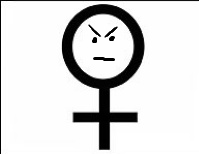A few weeks ago, I expressed some fear that perhaps the cis supremacists might be winning. Nothing has happened since then to allay these doubts: in fact, if anything, I am even more convinced that feminism has an enormous problem in its camp that some are doing all they can to keep raging.
Once again, I am not going to name names or link links, as the climate in which I write this post is somewhat sour, and it feels like any attempt to address the shit that is in our backyard is automatically taken as some sort of unsisterly “attack”, and cries of silencing abound.
Well, the thing is, when expressing some opinions, people should feel silenced. This is definitely the case with bigotry. Compare the rallying cry of the Daily Mail commenter, whining that one “cannot say anything any more” with how some cis feminists have reacted to being called out . It all comes from the same place, a sense of entitlement to being able to crap all over other people, because you and yours are clearly the most important people in the world.
And accusations of being unsisterly are just as absurd. As Stillicides so eloquently put it, sisters don’t have to get on. The belief that unpleasant opinions should not be challenged–and that it some kind of attack–if they are put forward by a woman is patently bollocks. Is it really OK for Nadine Dorries to poke around in our uteruses just because she is a woman? Should we just let her keep on going with this just because she is a woman? Of course fucking not, because it’s fucking dangerous rhetoric and absolutely should be challenged.
But, just as Dorries complained of victimisation because of our uterine missives, we see a lot of complaints of vicitimisation at calling out privilege and behaviour which–whether intentional or not–oppresses other women.
Being called out on bigotry may make you feel a bit bad. Hell, it might ruin your fucking day. But what it is you are being called out on ruins lives. Cissexism/transphobia, racism, classism, whorephobia, all of these oppressions are shit that a lot of women face on a daily basis from society at large, and then also from within feminism. It’s hardly sisterly to make these women feel like shit repeatedly just because you don’t really want to critically examine how you could be contributing to making them feel like shit.
And it’s hardly fucking silencing to have to shut the fuck up and apologise once in a while. What is silencing is telling a lot of women–women already struggling uphill–that their problems do not matter, that your own privileged freedom of speech is far more important. It is strange how listening to a diversity of opinions in feminism does not include listening to why bigotry is just not OK.
The people who are actually silenced and alienated by such challenges are precisely the people who need our help the most, whose voices we need to amplify rather than silence: trans women, women of colour, queer women, disabled women, women experiencing the diverse and horrid rainbow of intersectional oppression.
I am not sure why there is such a prolific belief that bigoted and problematic views cannot be challenged when articulated by a feminist. I understand fully that it is quite, quite horrible to realise that you’re actually part of the problem, but there are two ways to resolve this dissonance. The first is what too many people are doing: pretend that all of this criticism is unfounded. The second is what will actually make feminism stronger and help it to include all women: accept the criticism and try to change.
We have thrown far too many women under the bus already, when in fact what we should be doing is hijacking that bus and driving it at full throttle into the barrier marked KYRIARCHY.
Call-out week: a semi-coherent series of things on my mind

This is a perfect response to what’s been happening lately. Yeah, being told that you’re saying something awful feels crappy, but I bet it feels worse to be on the receiving end of transphobic abuse.
Not naming names & linking links is all very noble, but it also neatly prevents anyone interrogating the accusations of either bigotry *or* silencing. And so we rumble on. If I were the sort of person to do such a thing, I’d be on Twitter right now going “oh great, now @stavvers has called @TheWomensWoom transphobic”. Which I’m not and I won’t, but you can be sure someone will. You’ll be rightly outraged, but without the possibility of proving that’s not what you meant – because you’re being deliberately elliptical here – and the whole messy cycle will start again. Oy.
Nope. Sometimes being direct isn’t an option, particularly given the dominant narrative at play. I need to protect not just myself, but others here.
Not naming names is necessary because we’re losing and people’s lives and careers are on the line.
This page was linked from the Facebook page of a trans acquaintance, and wow, what an eye opener for a straight bloke who believes in feminism. I find it hard to put myself in the shoes of socially oppressed groups and not having a voice. Is this a matter of genetics or social conditioning? I think the latter, as I know many women whose presence demands that they be listened to, and others who though they have easily justifiable complaints, fail to speak up, not because they don’t feel they have the right to, but for fear of the consequences of being labelled a ‘ball-buster’, harridan, virago or other less eloquent name.
Change needs to begin at kindergarten level and as there are very few male nursery and infant teachers this should already be happening, as the vast majority of early authority role models are female.